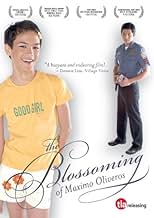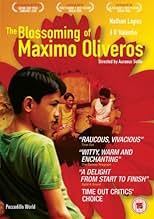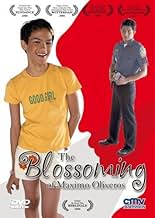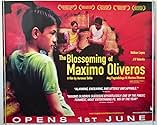VALUTAZIONE IMDb
7,0/10
1664
LA TUA VALUTAZIONE
Aggiungi una trama nella tua linguaA young boy falls in love with a handsome policeman who is investigating his family's criminal activities.A young boy falls in love with a handsome policeman who is investigating his family's criminal activities.A young boy falls in love with a handsome policeman who is investigating his family's criminal activities.
- Regia
- Sceneggiatura
- Star
- Premi
- 24 vittorie e 28 candidature totali
JR Valentin
- Victor Perez
- (as J.R. Valentin)
Jett Desalesa
- Leslie - Maxi's friend
- (as Sir Jett Desalesa)
Recensioni in evidenza
I really didn't know what to expect on sitting down to watch The Blossoming of Maximo Oliveros. Only knowing a few details of the plot - a young Philippino boy, the slums of Manila, a cop - I was worried that this was not likely to be the feelgood film of 2007!
How wrong I was. This film is one of the most unexpected delights of recent years, anchored by a central performance from 12-year-old Nathan Lopez that is dazzlingly mature and breathtakingly charming. Although the film does veer into melodramatic territory in the predictable conflict between JR Valentin's young cop and Maxi's family of petty criminals, the central storyline of Maxi's crush on the hunky policeman is handled with tremendous sensitivity, humour and warmth.
In a perfect world performances like Lopez's would gather awards like daffodils, but in the absence of any trophies I hope he's happy to have created such a memorable character. If your heart doesn't break watching Maxi's story, chances are you have no heart to break.
How wrong I was. This film is one of the most unexpected delights of recent years, anchored by a central performance from 12-year-old Nathan Lopez that is dazzlingly mature and breathtakingly charming. Although the film does veer into melodramatic territory in the predictable conflict between JR Valentin's young cop and Maxi's family of petty criminals, the central storyline of Maxi's crush on the hunky policeman is handled with tremendous sensitivity, humour and warmth.
In a perfect world performances like Lopez's would gather awards like daffodils, but in the absence of any trophies I hope he's happy to have created such a memorable character. If your heart doesn't break watching Maxi's story, chances are you have no heart to break.
Regardless the controversial topic and my non-knowledge of the reality of those events (for example, volume of corruption within police and acceptance of gays in the Phillippines), as for a film as such, it was skilfully accomplished: good/great performances by major actors, versatile direction and appropriate choice of music made Ang pagdadalaga ni Maximo Oliveros a smooth watch.
Due to limited space and time, however, the film had several documentary elements, and several events happening in the dark did not allow to follow them carefully (perhaps by virtue of modest technology used?). Thus, not a total contentment for me, but definitely a distinguishing and challenging creation to be screened in various festivals.
Due to limited space and time, however, the film had several documentary elements, and several events happening in the dark did not allow to follow them carefully (perhaps by virtue of modest technology used?). Thus, not a total contentment for me, but definitely a distinguishing and challenging creation to be screened in various festivals.
10fjgebaue
I saw this at the San Francisco Film Festival... it is really a beautifully done film that has both good laughs and good drama. It is amazing that this film was produced for about $10,000 US and was shot in 13 days in the director's own hometown neighborhood. This film will surprise you with its frankness and honesty, and I can't recommend it highly enough. I've seen plenty of boring and trite or irrelevant films at film festivals. This film is certainly worthy of your time and may change the way you look at poverty, at gay people, and at the nature of families and the love of parent and child, sibling and sibling. It is also a wonderful "barrio" film in the tradition of "Macho Dancer," but I think it does that film one better. I would definitely see this movie once or twice again. It is easily as good as any Hollywood film.
One can seldom discuss gay Filipino films without mentioning the Lino Brocka classic, "Macho Dancer". For a long time the film lorded over all the others in gay filmdom (or is it 'film gaydom'?). Sure there were competent ones like "Aishite Masu" and "Markova: Comfort Gay" but they were never thisclose to "Macho". Could "Ang Pagdadalaga ni Maximo Oliveros" finally be the one true contender for the throne?
Director Aureus Solito and writer Michiko Yamamoto have crafted a very likable coming of age story. The treatment of Maximo Oliveros' (Nathan Lopez) homosexuality is unique and refreshing for it is never questioned nor made an issue, just a fact as true as the sky is blue. It's a huge credit to the filmmakers for not resorting to easy laughs at the expense of gay characters. Camp is absolutely present but it's never overdone. In fact, I think one of the main reasons why the film works so well is because the whole film isn't overdone. The filmmakers know when to pull back just before a scene turns mushy or heavyhanded. Even something as elaborate as the mini-pageant scene is cut long enough to avoid unnecessary melodrama.
One of the film's most interesting aspects for a lot of viewers is the seemingly astonishing possibility that an effeminate homosexual can exist relatively peacefully in the slums, aka Hoodlum Central. Although I haven't seen this myself, I am convinced that cultural mores make this scenario very possible. Despite the influence of homophobic Roman Catholicism, the general mood in the country is situated somewhere between amusement, acceptance, and tolerance (though not immune to occasional spurts of homophobia). Let us not forget that pre-Spanish Philippine culture respected the 'babaylan', a gay priest(ess) of sorts.
The homoerotic love angle is beautifully handled, in my opinion. To start with, the leads are perfect. Lopez carries the film as Maximo while JR Valentin as the cop is hunky yet brotherly, respectable as necessary but not too antiseptic. You get a sense of hero worship, excessive caring, and strong attraction from the side of Maximo while from the other side you see a fraternal sense of caring, naivete, and a culturally-imbibed politeness that supersedes any possible homophobia. There's also a delicious hint of ambiguity in his sexuality. There are a number of memorable scenes between the two, but a brief, well-handled, but highly erotic one (which, under a weaker filmmaker, could've easily bordered on pedophilia considering Maximo's age) and the emotionally satisfying ending stand out the most.
Despite the fact that Maximo Oliveros is unapologetically gay the film isn't strictly gay-themed unless you consider puppy love, unrequited love, familial obligations, and economic struggles as such.
It was a proud moment to watch a Filipino film in the prestigious Lincoln Center New Films/New Directors series in New York City. It was icing on the cake to see someone from the Univ. of the Philippines do good, in the gay arena, no less. "As good as Hollywood films"? I say better. When did Hollywood ever show us a coming of age story with a gay lead character?
Director Aureus Solito and writer Michiko Yamamoto have crafted a very likable coming of age story. The treatment of Maximo Oliveros' (Nathan Lopez) homosexuality is unique and refreshing for it is never questioned nor made an issue, just a fact as true as the sky is blue. It's a huge credit to the filmmakers for not resorting to easy laughs at the expense of gay characters. Camp is absolutely present but it's never overdone. In fact, I think one of the main reasons why the film works so well is because the whole film isn't overdone. The filmmakers know when to pull back just before a scene turns mushy or heavyhanded. Even something as elaborate as the mini-pageant scene is cut long enough to avoid unnecessary melodrama.
One of the film's most interesting aspects for a lot of viewers is the seemingly astonishing possibility that an effeminate homosexual can exist relatively peacefully in the slums, aka Hoodlum Central. Although I haven't seen this myself, I am convinced that cultural mores make this scenario very possible. Despite the influence of homophobic Roman Catholicism, the general mood in the country is situated somewhere between amusement, acceptance, and tolerance (though not immune to occasional spurts of homophobia). Let us not forget that pre-Spanish Philippine culture respected the 'babaylan', a gay priest(ess) of sorts.
The homoerotic love angle is beautifully handled, in my opinion. To start with, the leads are perfect. Lopez carries the film as Maximo while JR Valentin as the cop is hunky yet brotherly, respectable as necessary but not too antiseptic. You get a sense of hero worship, excessive caring, and strong attraction from the side of Maximo while from the other side you see a fraternal sense of caring, naivete, and a culturally-imbibed politeness that supersedes any possible homophobia. There's also a delicious hint of ambiguity in his sexuality. There are a number of memorable scenes between the two, but a brief, well-handled, but highly erotic one (which, under a weaker filmmaker, could've easily bordered on pedophilia considering Maximo's age) and the emotionally satisfying ending stand out the most.
Despite the fact that Maximo Oliveros is unapologetically gay the film isn't strictly gay-themed unless you consider puppy love, unrequited love, familial obligations, and economic struggles as such.
It was a proud moment to watch a Filipino film in the prestigious Lincoln Center New Films/New Directors series in New York City. It was icing on the cake to see someone from the Univ. of the Philippines do good, in the gay arena, no less. "As good as Hollywood films"? I say better. When did Hollywood ever show us a coming of age story with a gay lead character?
This film tells the story of a young effeminate boy from a criminal family, who falls for a hunky local policeman in a deprived part of Manila.
A young transvestite boy, possibly transgendered as well,falling in love with a policeman. And it is hinted that the policeman has equal feelings towards him too! I would have thought such a topic should be taboo. The family is so accepting of Maximos that I find it really touching. I am quite in awe that the Filipino society is so accepting of the gay and transgender people.
As for the film, they use loads of natural lighting almost exclusively, so scenes are too dark most of the time. There is even a scene when the family watches TV without lights on! And they did not use a wide enough lens to film scenes in the house either. But these are only minor issues. The main thing is that the story itself is beautiful and brutal at the same time. "The Blossoming of Maximo Oliveros" is quite an eye opener for me.
A young transvestite boy, possibly transgendered as well,falling in love with a policeman. And it is hinted that the policeman has equal feelings towards him too! I would have thought such a topic should be taboo. The family is so accepting of Maximos that I find it really touching. I am quite in awe that the Filipino society is so accepting of the gay and transgender people.
As for the film, they use loads of natural lighting almost exclusively, so scenes are too dark most of the time. There is even a scene when the family watches TV without lights on! And they did not use a wide enough lens to film scenes in the house either. But these are only minor issues. The main thing is that the story itself is beautiful and brutal at the same time. "The Blossoming of Maximo Oliveros" is quite an eye opener for me.
Lo sapevi?
- QuizJoey Pepe Smith who plays the piano man being teased by the kids is the one who scored the film.
- ConnessioniReferenced in Ako ang simula: The ABS-CBN News and Current Affairs Yearend Special (2006)
- Colonne sonoreMy Country, My Philippines
Written and Performed by Yoyoy Villame
I più visti
Accedi per valutare e creare un elenco di titoli salvati per ottenere consigli personalizzati
- How long is The Blossoming of Maximo Oliveros?Powered by Alexa
Dettagli
- Data di uscita
- Paese di origine
- Siti ufficiali
- Lingue
- Celebre anche come
- The Blossoming of Maximo Oliveros
- Luoghi delle riprese
- Aziende produttrici
- Vedi altri crediti dell’azienda su IMDbPro
Botteghino
- Lordo Stati Uniti e Canada
- 28.041 USD
- Fine settimana di apertura Stati Uniti e Canada
- 6690 USD
- 24 set 2006
- Lordo in tutto il mondo
- 38.691 USD
- Tempo di esecuzione
- 1h 40min(100 min)
- Colore
Contribuisci a questa pagina
Suggerisci una modifica o aggiungi i contenuti mancanti

























